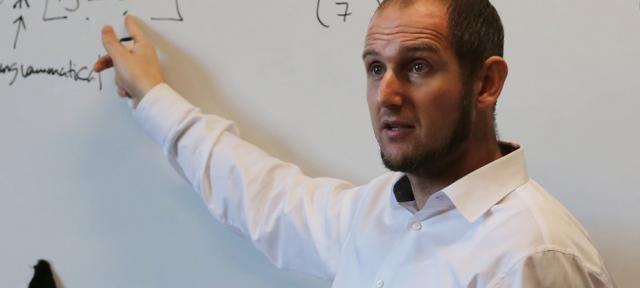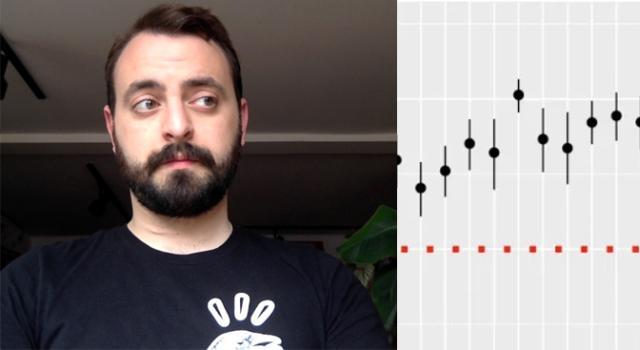New Faculty Q&A with Daniel Altshuler

Daniel Altshuler is a first-year linguistics professor who served Hampshire as the Andrew W. Mellon postdoctoral fellow in 2010-11. He has returned to join the faculty after spending three years as assistant professor of semantics at Heinrich-Heine-University, in Düsseldorf, Germany.
What’s interesting about linguistics to you?
My specialty is in meaning. What I’m really interested in is, What are the rules we follow that make our communication on the one hand effortless, but on the other hand such a beautiful, creative, communal process? How is it that we’re able to understand each other, and what does that tell us about the human brain? What draws me to doing linguistics, and especially semantic theory, is that developing a theory of meaning lets us know a lot about how the mind works.
How many languages do you speak?
I speak two natively: English and Russian. I speak a little bit of Spanish and, sadly, not enough German, considering I lived there for three years. I do research on a whole bunch of languages I don’t speak but I have a whole lot of working theoretical knowledge of the languages I work on.
One I’m currently working on and teaching about is a language called Osage, which is a recently extinct Native American language. The Osage tribe is still big, and they’re doing well, but their language has, unfortunately, ceased to exist, so that’s a language I know quite a bit about and study, even though I don’t speak it.
Where did you grow up?
That’s a long story. The first eight years of my life, I was in Moscow. Then I immigrated as a refugee through Vienna and Rome to come to the United States, to Southern California, where some family were living.
Given your upbringing, do you think you have a unique perspective?
It’s hard to say, because part of the question presupposes that others beside me are ordinary, and I think that everyone has an interesting, unique story to tell. I do offer an interesting, unique perspective, but at the same time, I have a lot of things that I look to other people for. I do feel fortunate to have experienced the world in a nontraditional way—the immigrant experience automatically makes it a unique perspective —but on the other hand, America is a whole land of immigrants.
Being part of academia in linguistics forces you to be part of a worldwide community, and I’ve traveled the world a lot. I have friends from all over the world, I feel extremely fortunate and lucky for that. That’s really at the heart of why I enjoy my job: to be part of academia is to be part of an international community.
What’s the coolest fact about you?
I come from a huge family of twins. I have a twin sister, I have two half sisters who are twins, my sister’s husband is a twin, and they’ve had twins for the last five generations going. I don’t know if that’s cool, but it’s the first thing that came to me.
No, that’s very cool! Now, can you recommend some books you like?
Sure, there are two books that come to mind. Anything by Franz Kafka; he’s my hero, so any Kafka novel is an unbelievable experience for me. One of my dreams is to teach a course in which we learn Kafka from a cognitive and linguistic perspective. The first-person, existential experience Kafka is able to provide is so awesome and interesting linguistically that I want to have the tools to understand that one day.
I’m also a very big fan of nineteenth-century French literature. At the peak of that, probably my favorite work is by Nerval, who is known to be the inspiration for Proust and some of his writings. A lot of his Nerval’s work is riddled with temporal ambiguities, where there are many possible interpretations to how time flows, so you as the reader become confused, so that hits you in the face because the character about whom you’re reading is confused himself. That’s a way to get a first-person experience that’s really, really neat.
What do you look forward to the most about teaching here?
There are a couple of things. One is I want to integrate an enthusiasm for linguistics here. There’s a huge culture at UMass, and I’d love to see a big, sustainable linguistics community at Hampshire, where students are doing fascinating Division III projects with linguistic components, speaking at undergraduate conferences, applying to grad schools, implementing it in many different ways. That’s the part I enjoy, where my own passion for linguistics and teaching translates into a student’s passion to have a linguistics concentration. For me, as an educator, that’s the biggest thrill: when I see that I’m having an impact on students’ lives.
If you could design your own Div III project, what would you study?
Because I’m a linguist at heart, I think it would have a linguistic component, but one thing I’d love to do is a Div III that’s visual or performative in some way. I’m terrible musically; I have no musical skills. I think that would be a motivation, where I’d want to explore that side of me—kind of in either a music domain, where there’s a rhythmic component and a performative element that ties in with language, or a visual domain. One of those two is probably what I’d do now, and I wish I could’ve done when I was younger.
You mentioned teaching a class that combines Kafka and cognition and linguistics. If you could teach a “dream class” on anything you could imagine, what would it be?
I think in a couple of years, I’d like to teach a class on understanding comedy from a linguistic perspective and thinking about the linguistics of humor. A good storyteller is also a comedian. A lot of comedy is storytelling, and the way it often proceeds is establishing language that’s ambiguous in some way. Comedians have to be masters of forcing the audience to have a certain interpretation, and at some point, the climax of the story, making them realize their interpretation was all wrong, that something else was intended. That realization is often what’s funny. You can think of defining humor in purely linguistic terms. I’ve always wanted to do something about that, where we learn a lot about linguistic theory and semantic theory by studying real phenomena, such as humor.



